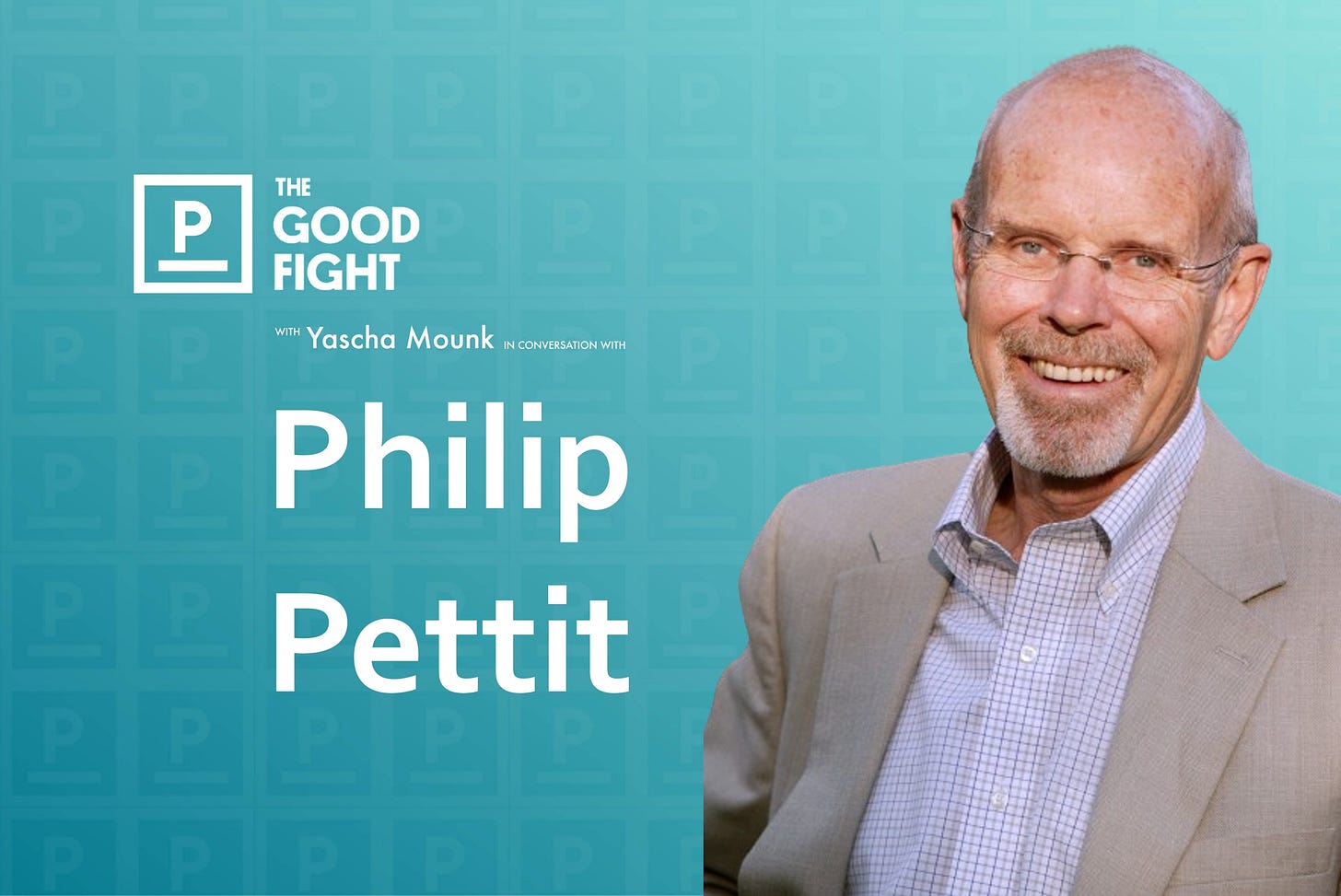Philip Pettit is the L.S. Rockefeller University Professor of Politics and Human Values at Princeton University. His latest book is The State.
In this week’s conversation, Yascha Mounk and Philip Pettit discuss the intellectual traditions of liberalism and republicanism; how freedom from domination differs from freedom from interference; and what role the state plays in making people free.
The transcript and conversation have been condensed and lightly edited for clarity.
Yascha Mounk: One thing that I talk a lot about on this podcast is the idea of liberalism and philosophical liberalism. Persuasion understands itself in many ways as a defender of liberal values. Now, you come from a tradition that is related, but subtly distinct, that of republicanism.
Why don't you explain to readers who may not know what republicanism is, what the core claims of the republican tradition are, and how they, to ask a very undergraduate question, compare and contrast with the tradition of liberalism?
Philip Pettit: The main thing to be said is that they both prioritize the ideal of freedom. The language of freedom is very much to the fore in each way of talking. The first contrast, I think, to make really is historical: what most people will identify now is a continuing republican tradition that goes back to classical Rome, to the Roman Republic. And whereas the liberal tradition, so-called, only identifies itself and appears in a distinctive form from the late 1700s. The contrast, though, in conceptual terms, is mainly a contrast in their way of understanding freedom.
The way that the Romans understood it was that, in order to be free, you basically had to be free of a “boss,” so to speak. It was having a boss, having a master, or having a dominus, in the Latin phrase, that made you unfree. And they made this split visible or salient by a particular image, which was the slave whose master is very kindly, gentle, gives the slave more or less carte blanche, and is very gullible so that the slave can run rings around the master, and for the Romans, that person, though they could act as they wish, almost across a whole range of choices, was not free, because they suffered towards the Romans called dominatio, which meant simply the existence of a master. Of course, the master didn't actually interfere with them, but he still made them unfree. Because whatever they were free to do, whatever they had a choice of doing, they were free to do only because the master allowed them. It was ultimately the master’s will that remained in charge. And that's a very important idea in this long Republican tradition, which begins in Rome, as I say, but it continues through, for example, the northern Italian cities of the High Middle Ages, the Renaissance cities, into the Dutch Republic, Polish Republic, the English Republic in the 17th century, and of course, the American republic—in particular, in the American Revolution and the War of Independence of the 18th century, as well as in the French.
For example, one of the great complaints in the 1760s is that while the British Parliament, as the master, had actually lifted the Stamp Act and in that way proved itself kindly, in an associated act they declared that they had the right to introduce that sort of taxation as they wished: “We are the boss, even though we are, in this instance, proving to be a kindly boss.”
Now, in the rival tradition, the idea for being free meant simply that you weren't actually interfered with. That made it easier in a way to be free because you could be free then, and yet have a master who could interfere if they wished in the life of the person—that did not make you unfree. And of course, that suited the purposes of lots of people of that period because it enabled them to say, for example, that no matter how harsh a factory owner was in dealing with their workers, even though they had the power of throwing the weight around, insofar as they didn't actually throw their weight around those workers were perfectly free. Jefferson recoiled from that idea, didn't even want industry in North America, because he felt the factory regime inevitably put workers under the will of the employer who could throw his weight around without the workers moving or going away, because there wasn't anywhere else much to go away to that was at least acceptable.
Mounk: Let me parse through this. I think clearly the social and political ideal of not suffering domination is a very important and attractive one. I think, in a much less extreme way that perhaps we can relate to today, I always end up thinking of the UK version of The Office: the employees of David Brent are often free to do as they wish, they have a lot of liberties (perhaps more liberties than they should have in a well-functioning office), but because they are subject to the arbitrary whim of a narcissistic boss, they chafe under this real sense and feeling of domination. And I think that that gives a good sense of what the social concern is here.
There's then two questions. One is how much of a challenge that is to traditional philosophical notions of freedom? Then there's the broader question of how much of a challenge that is to the historical tradition of liberalism that a lot of people today are motivated by. Now, again, insofar as some philosophers have defined freedom merely as non-interference, I think you're right that you can come to these examples and say, “Hey, here's an example of the worker, at David Brent’s office, or in a more extreme example of an enslaved person in the Roman Republic; they’re not being interfered with, but surely they’re not free. That philosophical conception of freedom is non-interference is incomplete, we need to change or amend or supplement it.”
I guess I wonder whether there are any liberals on your accounting, because somebody like John Stuart Mill, one of the classic liberals, talks deeply about domination in texts like On the Subjection of Women, where he says, “I, as a husband, want to renounce my rights over my wife that English law gave me in the 19th century: because I'm not capable of doing that, it changes the nature of our relationship in a way that does damage to it; that actually it does damage to my ability to live in a relationship of equals.” Mill certainly recognized, I would argue, the social ideal of non-domination. And when you're looking at the core liberal freedoms that liberal states have granted their citizens, certainly in the economic realm and other realms, there’s things where we might want to supplement what they do, but some of the core rights of the First Amendment in the United States, the right to freedom of assembly, the right to freedom of worship—all of those, surely, are not just meant to ensure non-interference, but are motivated by non-domination.
So, how much is this a way of re-describing what the liberal tradition is and how it should understand itself, and how much is it actually a challenge to the liberal tradition?
Pettit: First of all, the American Constitution, written in 1787 or so, does reflect, I think, a very long tradition of republican thinking, as all of the Founders were well aware. When they campaigned, in many cases, they actually wore a toga. They were that aware of the Roman connection, and that that's where they were coming from.
The classical liberal way of thinking actually appears first, I think, most clearly in the work of Jeremy Bentham, when he explicitly says to be free is “to be free of restraint and constraint.” And he concludes from that, that, actually, that means that the law itself makes you unfree, because it constrains you and so on. He, of course, was a utilitarian. So freedom mattered only as a component in overall utility welfare. But his line on freedom appears to be taken up by a range of thinkers who wanted then to say, as republicans had always said, that the really high and almost the only value is freedom.
Let me just say the word “republican” itself is also problematic, because, for example, most of the English thinkers and theorists that really influenced the Americans in great part did not describe themselves often as republicans after 1660, and they described themselves as “commonwealth men,” because the word “republic” would suggest they were against a king, whereas, at that point, they'd come to think not having a king is really not all that important in republicanism. So the word “liberal” is really hard to use. And it is worth remembering, it only came into usage in the early 1800s, in the sense in which we use it.
Mounk: That is a frustration I often have, just because, in everyday political language, the word “liberal” means such different things. It's a trivial but important point. When I went around for a good number of years after 2015 warning about the threat that populists posed to liberal democracy, no matter how often we emphasize, to an American audience, that “liberal” is not coterminous with “left wing,” the reaction from conservative listeners, television viewers, and readers would be, “We don't want liberal democracy. We're conservatives!” You go to France, and suddenly the valence of “liberal” is the opposite: “We don't want liberal because that means being laissez-faire on the economy. We are leftists!” And, of course, the term “republican” has similar problems because it refers to a political party at this point in the United States, as well as in France.
If you think of freedom today, as I think many people do, as non-interference (you are free when there isn't somebody telling you what to do, as long as the state isn't passing certain laws and regulations that constrain your freedom of action), what does that get wrong? How can we find social and political policies that are going to create a better country and a better world, if we embrace the idea that freedom involves non-domination, not just not interference?
Pettit: Let's take two areas of packages of policy, so to speak. One you might call the “social area,” the other the “democratic political area.” Now, in the social area, you’re wondering about what are the constraints that should be laid on people in how they treat one another, or laid on “private” bodies like corporations or churches and how they should treat individuals. If you think of freedom as non-interference, the tendency is to think, “Well, so far as possible, we should let things rip.” In other words, we should let people just choose as they wish. Of course, immediately we realize, people can do harm to one another, so we need to constrain them. They can do as they wish so long as they're not harming others. But then there are further sorts of actions that have side effects that harm others; maybe there need to be constraints on those as well. But when it comes to issues like that of social security (should people be helped in order to educate our children, in order to be medically insured, in order to be judicially insured, for having representation if they have to go before the courts?)—it's not clear why, on this particular ideal, there should be that “security legislation” that enables people to deal with these disadvantages they suffer. And in this neoliberal package, you're allowed, so to speak, to go beyond the idea of letting things rip, only in order to guard against public disruption, disorder, people actually dying, or whatever, but it's an emergency type of back-up legislation that you want on that front.
Now, if you think, on the contrary, that freedom really requires non-domination, that is to say, security against others, the first question, of course, is how much security should we get against others? And I've always said that you have enough security against others insofar as each is able to look the others in the eye without reason for fear or deference. But in order for people to be able to live in that sort of equality and be secure, as others are secure, they're going to have to have access to education resources, of course, and emergency resources (as they're basically dependent on the wheel of philanthropy or whatever it might be). And so you're going to have to have a state that enables people to enjoy that status of being able to look others in the eye without fear or deference. And that means you have to have, for example, insurance against failure of employment, you've got to have, I think, quite strict rules governing the employment relationship, which is a relationship where there's a certain asymmetry of power—for example, the right to fire at will, which a lot of American employers enjoy. I would say that gives the employer such an asymmetry of power over the employee, who's always going to be unwilling to be fired (transaction costs are huge, you have to find another job, it's a bad mark on your record, and so on), that the manager, employer, whatever, is in a position where they can throw their weight around without fear, so to speak, of the person leaving the job. The workplace in America is a place where there is a lot of domination—I mean, it's not like a slave owner's domination, it's not wide and it's not deep. But I think that it is a site where these two ideas give very, very different lessons.
Mounk: And that is very convincing to me. I have a few thoughts on this. One is about how much of this can be solved with regulation and how much this is a question of broader culture (and, sometimes, in a paradoxical way). I grew up in Germany and went to school there. And then came to the University of Cambridge in England, where I studied history with some of the people who inspired this work, people like Quentin Skinner—some of these ideas that you've advanced in a more analytical and philosophical mode. And one of the things I loved about being at Cambridge is that my teachers taught me to look them in the eye and contest what they were saying, after going to school in an environment where my high school teachers were mostly displeased if I disagreed; I remember in the first week of term having a one-on-one supervision. And my supervisor said, “You summarized these readings I gave you well, and that's great, but what's your opinion?” That was striking. But oddly, if you analyze the rules and regulations of Trinity College, Cambridge, it was an incredibly hierarchical place. The fellows of the college sat at “high table,” raised above the students, in a separate area of a dining hall, when they were having lunch and dinner. There were these beautiful lawns in the middle of these medieval courtyards, and they were allowed to walk across the lawn and I, as a student, was not (if I did, a porter would reprimand me in very firm terms).
Now, I did a lot of theater in college. I wanted to be a theater director, and I went back to Germany and worked in a professional theater for a year as an assistant director. I thought this was going to be my career. And I hated it. I hated it for various reasons, including the fact that though everybody was buddy-buddy, though everybody addressed each other in German by the informal address; in whatever we talked about, I was supposed to be deferential to the director, and not just when we talked about the details of the artistic production. Even when we talked about politics or football, there was a social expectation of deference. I could not look the director in the eye.
How do you create a culture where you can look each other in the eye? Because if you analyze institutional settings from the outside, you would look at Cambridge and think “What a hierarchical place!” And yet it did give me that freedom that I could sit across with very accomplished academics as an 18-year-old and say, “I disagree with you! I think this.” They were encouraging me to do that. Whereas in the setting of the theater in Germany, where we're all sort of sitting around having beers and pretending to be friends, I felt that I had to hold back; that if I disagreed with my boss’ analysis of a sports game, it would not go well for me.
Pettit: On culture and regulation—culture is deeply important in a case like this. But I think that law and culture support one another. So for example, in the employment area, I think it's very important that there are appropriate laws, for example, that there isn't a right to fire without cause, that you at least have some sort of procedure laid down, that the employer, at least if the employee has been there for a certain time, has to go through in order to establish that it's okay to let this worker go. Equally, I think there should be laws that, at least in many areas, do not impose a “no compete” clause. In lots of areas of employment in North America, now, lots of employment laws say, basically, if you leave voluntarily then you can’t work in the same industry for a certain amount of time. That's extremely restrictive and disempowers the worker. Or an arbitration clause, as many employment contracts have now, too, which requires that if there's a dispute between the employer and the employee to go to arbitration and not to a court, that effectively blocks the possibility of class action against the employer. There are all sorts of laws like that that need changing.
In the neoliberal tradition, the view is that if you've entered a contract and signed up to a contract, then that means that anything that happens under the terms of the contract is OK, because you have signed up to it and indicated it's by your will. In the other republican tradition, there's a very different view of contract. In that tradition, you'd be very critical of a contract that enabled one person in the contract to have this sort of dominating power over another. The idea of just sort of saying, “Well, the contract sanctifies all,” even though it was done last year, or five years ago—that's simply not acceptable. You've got to have a relationship within which there is not domination.
To the culture-law thing that you mentioned, I think it's important that laws are introduced of this kind that deny or restrict these powers on the employer’s part. But equally, it's very important that the culture among the workers should be that of standing together, for example, insofar as they have a common cause; and that they're enabled to act as a group, and usually against a much more powerful, often incorporated employer. And the right of unionization is absolutely, it seems to me, sacrosanct. We've seen that decline massively in the United States. And there's a very strict correlation worldwide between the decline in unionization and the decline in the wages of those who otherwise would be unionized. And unions bring with them a culture that, in traditional terms, was a very powerful culture (in the United States in the late 19 century, a culture of opposition). And their catchcry was freedom, because they felt that they were “wage slaves” (that was, by the way, a republican phrase used by Jefferson at one point, which was taken over later by European Socialists).
I think what's really important is that people don't have to defer to one another out of fear of the power of the other person in their lives.
Mounk: I think the relationship between institutional power and rules and culture is complicated—they have to both work in the right way to create an absence of domination, but that might be intricate. When I look back at Cambridge, I wonder whether these external shows of hierarchy are part of what allowed my supervisor to have the self-confidence to say, “Go challenge me, push back against what I say, because if you annoy me too much, and I need to sort of rediscover my amour propre, I could just walk across the lawn and let you stand on the side of it.” So there's a kind of weird paradoxical relationship here. But then those important institutional elements actually encourage students to be less afraid to speak up.
And I think the clearest element of this institutionally in American academia is the tenure process, which is one of the reasons why, on grounds of academic freedom, we probably need a tenure system. But it also cows people for a very long part of their academic career. And the most obvious case of people in these institutions not being able to look each other in the eye is an untenured, assistant, or associate professor dealing with a senior faculty member. And that's interesting, particularly in departments that pride themselves in equality but have this very strong form of domination in their midst.
Pettit: I agree. I think there are those powers in academia in America, for example, that might well be moderated. When I came to America to teach in my earlier years there, I always reminded the students that if you ever feel I've dealt with you unfairly, we will refer this to an independent examiner, because I was shocked at the fact that I had the power, so to speak.
Mounk: I wonder about one other thing, because I do think that talking and thinking about domination is a very fruitful way of recasting some of the political conversations we have. In the book I just published, The Identity Trap, I talk in part about what it takes for us to maintain a culture of free speech. And I ended up worrying about things like at-will employment, because it means that your employer can fire you for inconvenient political speech. And so I have a set of rules and regulations I suggest in the book to curb the corporate power over the political activity of individuals: I don't think that corporations should be able to fire employees for political speech, as long as it happens outside of a workplace. I think that providers of key public services that might be private providers but that provide services that most citizens need for key functions of their life should not be allowed to sever their relationships with you on political grounds, either—a bank should not be allowed to stop allowing you to have a bank account; an airline should not be allowed to tell you that you're not allowed to fly; an internet payment processor should not be allowed to refuse business with you on the basis of your political views.
And as I'm reflecting on this argument, I am thinking perhaps I should have reread some of your work just before writing the chapter. Because the core concern here does in part seem to be domination, it seems to be not just that some people will be unfairly punished but about the fact that in our social and political life in the last ten years, people have often felt that there are arbitrary lines that get them into hot water. It's not clear where those lines are. And even if it's relatively rare that your account will be demonetised, that you lose your bank account (as has happened to some people in the United Kingdom, etc.) the fear of that makes you sufficiently apprehensive as to hold back. And that actually seems like a core case of domination.
Pettit: I absolutely back what you just said about these protections. They're vital. And I think so we're talking about how these two positions designate, neoliberal and neorepublican—
Mounk: —neoliberal, just to keep track of it for listeners, being non-interference, and neorepublican being more ambitious non-domination.
Pettit: Exactly, yes. And it illustrates the difference of policy in the social area. A second area of policies is the democratic, or the political, and that bears on those laws that govern how the lawmakers relate to us, the lawtakers. People who go the neoliberal way, traditionally, almost all say, “Look, law may be necessary. But law is essentially an affront against liberty. It's sort of depriving us of liberty. It may give us more liberty overall than it deprives us of. It may perpetrate less interference in constraining us than it prevents in constraining other people from interfering with us.” Now, I think that that is very different from the neorepublican line, because on that line and on the classical republican line, going way back, you're free only in virtue of the law and the norms and mores of the society giving you security or protection against others in the society. You're only free in virtue of the law, it's that that enables you to look others in the eye without reason for fear and deference. We shouldn't be loath to have a state. We shouldn't be reluctant about having a state. We depend on the state in order individually to enjoy the sort of freedom that might be described as freedom, not domination.
However, of course, the lawmakers can also use the power that we give them to make laws and they can begin to make laws that, for example, run against the interests of a whole sector of the society, if the majority support them. They may begin to make laws that suit the cronies that support them financially or whatever. So what's really important, too, is that while the state is entitled to interfere with people, that it doesn't interfere in a dominating way. The point is, if you think freedom is non-domination, then there are two radical conclusions that make a difference from neoliberalism. One is that you can be unfree without being interfered with (that's the case we talked about with the gentle master). But another result is that you can be interfered with without being dominated. So for example, those in government, if we really have sufficient control over the way laws are passed, whether imposed and so on (knowing this is very ideal, I agree), but if we have that sort of control, we the ordinary decision takers, then while they would be entitled to make laws, they'd be entitled to make laws on terms, so to speak, that we lay down.
Mounk: Let me ask you a very naive question: why choose between these two different notions? Why think that one of these is the true gauge of what matters in the world or even of what helps to define freedom and the other is erroneous, why not say that? When people interfere with you, your freedom is curtailed, but when you are dominated, your freedom is also curtailed. And in some situations, these things are going to point in the same direction, and in some situations, these two are going to come apart. And in those moments, the fact that we can refer to as two different conceptual traditions actually helps to explain the situation precisely because it helps us to describe how it is complicated: Yes, we are interfering with the person standing on the street corner, and, insofar as that goes, that is something we should be concerned about. But this also helps to ensure that public order is maintained or that people don't feel dominated by random, violent people who might assault them, and, therefore, even if they haven't been interfered with, might refrain from going out in the street. And that's also something that matters.
Isn't sort of accepting both of those terms as being useful in their own right something that helps us bring out the subtlety of the situation?
Pettit: Why choose one rather than the other? Of course, our ways of speaking only very loosely constrain how we think politically. We make the choice between these two very different conceptions of freedom, and these two very different political philosophies, because the different policy packages attached to them should be based on what John Rawls called the “test of reflective equilibrium;” each of us needs to ask ourselves which approach would seem to support most of our considered judgments about what is just. I would say that most people will think that it is unjust that a child should not be assured of a decent education. And I say that the notion of freedom as non-domination would actually give you those results that would support that.
Let's come back to the political area, we're talking about how to think about the relationship between government and citizens, the lawmakers and the law takers. And here, I think the same sort of issue arises, if you believe that freedom is just non-interference. Then the interesting and very, I think, disturbing thing is that that doesn't actually give you an idea of democracy. So, for example, Isaiah Berlin, who thought of freedom in terms of non-interference, says that there is no inherent connection between the ideal of freedom and the ideal of democracy, or democratic control of the people over government.
And indeed, there are a whole range of thinkers in the classical liberal tradition who say the same thing, that in even the very absolute sort of dictatorship, the dictator may not interfere very much with his or her people and may actually keep a degree of order in place such that people enjoy a good deal of non-interference from another's hands, and actually there may be less interference suffered (that's what even Berlin is willing to acknowledge, in the sense of non-interference) under a dictatorship than under a democracy. Now, if you think freedom is non-domination, then, of course, you recoil from the idea of an absolute dictator—any kind, because he, she, or they represent the ultimate dominator. And actually, this is mainly where the tradition of republicanism has argued against any form of absolute monarchy, which was the embodiment of the dictatorship. Yes, we got to do something about keeping the lawmakers under our shared control. Now, elections are a very, very absolutely indispensable part of keeping lawmakers under control. But there's also contestation, there's freedom of speech, and there's freedom of association. There's all of that which, actually, elections, I think, help to nurture. That's part of the reason why elections are so important. But the fact that people can protest like that via the courts, via the media, on the streets, is really, really important, because it keeps government on its toes. It means government can't be too arbitrary in its decisions.
Mounk: This may not be a question about the deep structure of your views but rather about how to apply them to something like a political system, but it is clear to me how one way of recasting the need for checks and balances, the need for constraints on the power even of elected prime ministers and presidents, absolutely, it's in terms of non-domination, right, that if judges on the Supreme Court think that they're going to be fired if they rule against the president, then that may influence how they act in ways that are deeply damaging. But we need to empower actors within the state who are not the elected head of government or head of state, to look them in the eye, as equals, and say this is not within your authority, it's within my authority in order to sustain those democratic governments over time. And I think that's a nice way of recasting some of the concerns that I and others have had for a long time about the rise of authoritarian populists.
Now, on the other hand, you might say, if the solution to this is the rise of all of these institutions, but they are not under the direct control of the government and don't have a straightforward mechanism of democratic accountability, then that also allows a broader social milieu of highly-educated, mostly affluent, relatively elite people to dominate ordinary citizens; that the kinds of people who are on the Supreme Court and the kinds of people who are running the FTC and the kinds of people who negotiate trade agreements, and so on, so forth, all the people who are in charge of those institutions, who you just praise, but, excepted from direct democratic legitimacy, come from a very similar background. In protecting against one form of domination, aren’t we opening the door to a second, broader social form of domination?
Pettit: Yes, I think we are. We need to extend our thinking to include the protections against that sort of elitism. Of course, there's elitism and there’s cronyism, they are quite different and need different ways of dealing with them in a way. I think we should have more recourse to what people call “citizens assemblies,” in which you get a statistically representative sample of the people together and persuade them to think about a particular issue legislation and to give advice on that. The Irish do that extremely well prior to recent referenda, and it's clear that people felt that well, if this group, you know, which represented all of us really argued that same sex marriage was one of the issues, that this really was something required by our principles, then that really is important, and it's not just passed down from an elitist group. It's a very small device. But I think that device, for example, can help to guard against elitism.
One of the things about the United States—I mean, it's a wonderful constitution in so many ways. But, of course, it's all technology. And we can now see more clearly, it's almost impossible to amend under current circumstances. But one of the things that I think was a mistake on the part of the Founders was not to have a head of state who is independent of the head of government. I think it's very important that you have a head of state that is seen by people as representative of the state, of us all together, and can be like a flag, something around which we rally even as we belong to different parties and different sorts of pressure groups and different causes and see as the basic source of unity. I think that might also guard against elitism in an indirect way. Public interest groups should, in particular, be very, very intent on bringing different sides of the society into their ranks and making this a matter of public recognition that this interest group is not just representative of an elite few, that it's really open to a whole range of ordinary people.
Mounk: I find the point about the separation of the head of government from head of state to be very astute. I think Prime Minister's Questions in Britain, which exists in different forms in some other jurisdictions as well is a great example of this: you have to have some deference towards the king or the queen but you don't have the same deference to the Prime Minister because he's but the monarch’s most humble servant. He is but the head of the government, he's not a representative of the state. That, I think, can create a healthy political culture.
How, very briefly, does your philosophical perspective reshape how we should think about the state?
Pettit: I think we've given too little attention to the state. We focus a lot on social justice and democratic justice, the two areas of policy we've been talking about, for example. John Rawls, the person I cited on the reflective equilibrium test, the greatest political philosopher of the 20th century by a longshot—when he begins his Theory of Justice says what we assume about the society is that it's a “cooperative venture for the mutual benefit of citizens”—a very nice phrase, but my goodness, that's not really a characterization of the society that we exist in that can be then given carriage of policies of justice.
The truth is, we will only get to a more just world I think, domestically, insofar as the state is capable of delivering both the laws that will give the social security required for private non-domination (by other people and corporations and so on). And it's only the state and the people (through the state, of course) that can establish enough control over those in government to ensure that when they make laws, they make laws on the people's terms, and not at their own choice.
Please do listen and spread the word about The Good Fight.
If you have not yet signed up for our podcast, please do so now by following this link on your phone.
Email: podcast@persuasion.community
Podcast production by Brendan Ruberry and Jack Shields.
Connect with us! Spotify | Apple | Google
Twitter: @Yascha_Mounk & @JoinPersuasion
YouTube: Yascha Mounk, Persuasion
LinkedIn: Persuasion Community












